Forum - View topicErrinundra's Beautiful Fighting Girl #133: Taiman Blues: Ladies' Chapter - Mayumi
|
Goto page Previous Next |
| Author | Message | |||||
|---|---|---|---|---|---|---|
Alan45
 Village Elder Village ElderPosts: 9835 Location: Virginia |
|
|||||
|
@Psycho 101
I picked up The Disappearance of Nagato Yuki-chan as part of the "Ultimate Collectors Edition" (pretentious much?) Bluray version. I haven't watched it yet and I just got a ton of new stuff so it may be awhile. I also have the manga version of that. I tend to pick up Haruhi related stuff reflexively. When I get a chance I'll let you know. Night fox wrote:
No, I mean alternate as opposed to the story shown on the screen, in the manga or written in the book. I usually take my entertainment at face value without any attempt to find hidden meanings, themes, politics or messages. I would say I do this intentionally as I feel most entertainment is too shallow to warrant such effort, but I really have no choice as I'm more or less blind to such things. Looking deeper into such things is fine for those who enjoy it, but it is not for me. I normally avoid discussions such as this as I have little to add, however Errirundera's interpretation bothered me since I feel it leaves the entire series on a foundation of sand, if not on a bottomless swamp. Throughout the entire anime series and the novels there is no story except the first person narrative. There are no framing devices and no alternate viewpoints. Once you question Kyon's veracity, the entire structure falls apart. That is fine if you want to look at it that way but it hits a nerve with me. I'll stick with the story as shown. |
||||||
|
||||||
|
Jose Cruz
Posts: 1773 Location: South America |
|
|||||
|
@Errinundra, very cool review of Haruhi. I myself never interpreted it from that perspective. I assumed Kyon was a reliable narrator all the way but instead if we allow for his subjectivity to affect what we see the show actually makes a lot more sense: bored guy daydreaming all the time is a great explanation for all the enormous amount of nonsense the series throws at us. Actually my perception of the series has improved a lot just from your review. I rated it good when I first watched it, now I might try rewatching it since it has been nearly 4 years since I first watched it.
Well I love Kyoto Animation in general and Haruhi was the least favorite of the studio for me. |
||||||
|
||||||
|
Night fox
Posts: 561 Location: Sweden |
|
|||||
I understand if you don't want a lengthy discussion about this, but I just had to comment on that. When you watch a piece of art, you are in fact making your own interpretation of said work, whether you like it or not. The creators behind it are not commenting in your ear what to think, or feel, about it. Every individual use their own judgement to assess what they see and hear on-screen: Does she like him, or is she more into his best friend? Is that the limit of his power? Was she really all evil, or was there good in her? Did he really die back there? Some questions might be addressed by the author as the show progresses, while others will be left unresolved. The point it that just because you didn't see things in a certain way the first time you watched a show, doesn't mean that the author intended to hide it from you. It simply means that, if there was anything to discover, you missed it the first time around. If your first interpretation of the earth is that it's obviously flat, the centre of the universe, has unlimited resources, and that it has a star orbiting it, I'd suggest that you keep trying. |
||||||
|
||||||
Alan45
 Village Elder Village ElderPosts: 9835 Location: Virginia |
|
|||||
|
@Night fox
I don't mind discussing it, but I think our approach to anime is too far apart for us to agree. I'm firmly of the opinion that for the majority of anime, as with the majority of genre fiction regardless of country, that what you see on the screen is the story intended. I see no need for interpretation beyond a basic understanding of language and the visuals as presented. In the case of anime, it helps to have some basic understanding of their visual conventions and some idea of Japanese culture. Essentially I feel that the author in most cases has no greater goal than the writing of a story that will entertain and please his audience and thereby earn him a paycheck. This is especially appropriate to anime when you read about the way manga, light novels and anime are ground out like so many sausages. In many cases, the only lesson to be learned is that the character designer likes big boobs. When a show does have an agenda or message to impart, they usually beat you over the head with it. I don't mean that as a negative. I tend to consume them the same way. I either enjoy the story being told and the characters in it or I don't finish the show or the book. I realize that there are some anime that aspire to higher things, but I usually find that they are not for me. Among other things, I note that high art usually involves intense suffering and probably a bad end. Now, if you want to watch a show like TMoHS and can see further into that millstone than just the surface, that is fine. Me, I just move on to the next show. When I watch a show for a second or third time, it is because I want to experience that story again, not because I think I missed something. By the way, I have never lived anywhere where the world was even close to flat. That would be the mid west. Here it is hills and mountains everywhere. |
||||||
|
||||||
|
Errinundra
Moderator
Posts: 6523 Location: Melbourne, Oz |
|
|||||
I've confirmed that it's streaming on AnimeLab so I'll watch it and include it as part of this franchise review series. Your name is showing at the Nova Cinema next week, so my Haruhi interruption of my early Toei films series will be interrupted further. It's like a dream within a dream.
Thanks for the kind words. I'll be pushing the argument further with my review of the second season.
Welcome to the quicksand world of postmodernism. |
||||||
|
||||||
Alan45
 Village Elder Village ElderPosts: 9835 Location: Virginia |
|
|||||
|
Errinundra wrote:
Thanks, but I think I'll just stay here where things make sense. Postmodernism |
||||||
|
||||||
|
Jose Cruz
Posts: 1773 Location: South America |
|
|||||
|
In Miyazaki's My Neighbor Totoro the existence of the Totoros is also very much in doubt, the movie is clearly an essay about children's imagination and you can interpret the movie with or without the Totoros existing (it doesn't change the movie a lot though) and in the case of Haruhi the series is about a bored highschool otaku being pulled into a series of absurd and fantastical events, clearly a show about teenagers' imagination. Although in the second case the difference between interpreting what happens is Kyon's imagination or not is much greater.
|
||||||
|
||||||
|
Errinundra
Moderator
Posts: 6523 Location: Melbourne, Oz |
|
|||||
|
I've introduced an innovation this week - separate text boxes. I doubt they'll be a regular feature, but as their content is either speculative or tangential I thought it would be appropriate to remove them from the review proper.
Again, there's a spoiler warning and, again, this post assumes you've seen the anime. The Melancholy of Haruhi Suzumiya Season 2 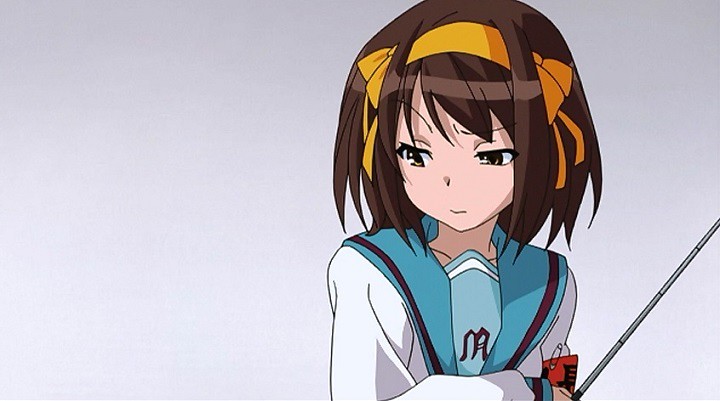
If only Kyon would come up behind Haruhi, embrace her and say he loves her. That's what Koizumi tells Kyon to do. Seven times. Reason for watching: Having enjoyed the first season as much as I did, I snapped up the second release pretty much as soon as it became available from Madman, though I must admit to having some trepidation, what with all the notoriety the Endless Eight arc had garnered. Nick Creamer's recent review prompted the re-watch. Synopsis: Whereas the first season had one major story arc and multiple one or two episode events, the second season can be broken into three discrete stories. 1. Bamboo Leaf Rhapsody (one episode): In a prelude to the Disappearance of Haruhi Suzumiya, Mikuru Asahina sends Kyon back three years to the fateful night when Haruhi's story - as we know it - begins and where he learns he is more accountable for later developments than he imagined. 2. Endless Eight (eight near identical episodes): with the S.O.S. Brigade reliving the last two weeks of summer over 15,000 times, Kyon must find the key that will free them from the time loop. 3. The Sigh of Haruhi Suzumiya (five episodes): Haruhi bullies the S.O.S. brigade and a less than enthusiastic Kyon into making a feature film for the school cultural festival, but, as usual, things get well and truly metafictional before the film gets its premiere. Comments: In the Endless Eight arc, Mikuru Asahina tries to explain how she discovered she can no longer go back to the future, but is stymied by having to repeatedly substitute the term "classified information" for what she is saying. Kyon wonders to himself, in both the sub and the dub, if she's doing this because she knows she's on television. This breaking of the fourth wall fits in neatly with Kyon's conspiratorial dialogue with the viewer. As with the anime references in the first series, this gag is flagging to the viewers that we are part of the metafictional game playing that is so characteristic of the franchise. Where the first season pokes fun at conventional anime story telling - mainly via Kyon as unreliable narrator - the second launches a full on assault on our expectations. Along with Satoshi Kon's Paprika, this second series is quite likely the most determinedly postmodern anime ever made. One of the characteristic qualities of postmodernism is a sense of fun, but, while series two continues with the absurdities and deliberate contradictions, it too often strays into uncomfortable territory. The satire is now less affectionate; the behaviours of Kyon and Haruhi more questionable. 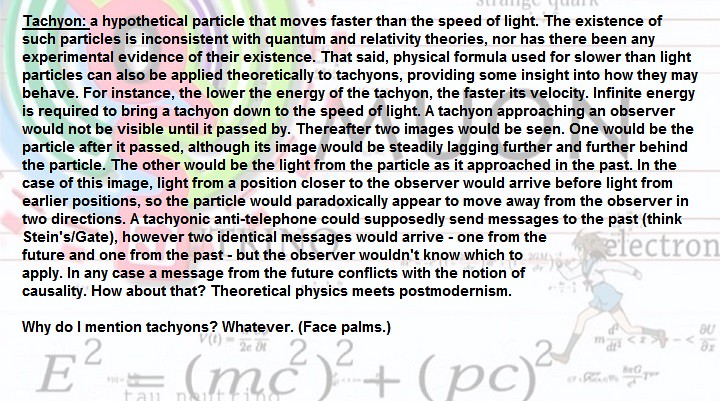
Another anime series that explores time travel, Steins;Gate, eventually falls over, not only because of the ridiculous sacrifices the harem girls must make in order to help the protagonist, but also because it treats its tachyonic anti-telephone premise way too seriously to assimilate all the paradoxes (known in physics as Tolman's Paradox) within a coherent narrative framework. Melancholy 2 has no such problems. Because it is taking the mickey out of time travel narratives it not only embraces the paradox but proudly wears it on its sleeve. In Bamboo Leaf Rhapsody Mikuru sends Kyon back three years so Haruhi can learn about the existence of Kyon's school, North High. Haruhi will, in time, enrol there because of the information Kyon gives her (as revealed in the Disappearance of Haruhi Suzumiya); the informaton he gives her is predicated upon her being enrolled. Tolman's Paradox #1. The older Mikuru reveals to Kyon the star shaped mole in her cleavage (see last image on this page). Kyon reveals it to the younger Mikuru. Tolman's Paradox #2. These contradictions are deliberate: Kyon is a fabulist; we cannot believe anything he tells us. They are germaine to the metafictional games being played. The infamous Endless Eight arc wages the franchise's most ambitious and pungent assault on the narrative expectations of the viewer. It is pure postmodernism, in the same way that Italo Calvino in If on a winter's night a traveller and Thomas Pynchon in The Crying of Lot 49 constantly and deliberately thwart our desire for resolution and certainty. Whereas the two novels can be frustrating, Endless Eight is as subtle as a wedgie eating roadkill. Showing essentially the same episode eight times in a row, all bar the last ending with the same lack of resolution, the arc is spectacular in its pomo ambition and in its alienation of the viewer. The joke has gone too far. That said, watching the arc over three nights this time around, I must admit that it wasn't as unbearable as I feared. The artwork is completely different in each episode - the clothes, the framing, the depiction of the locales are fresh each time, even if the dialogue and narrative are much the same - so it was some consolation playing spot the difference. Like so much postmodernism the premise is flimsy, but breadth rather than depth is a hallmark of the movement. And, wow, do we get breadth, or what? Well, eight episodes of breadth, to be exact. To its credit, the arc ends on a note of ambiguity - the S.O.S. Brigade escapes the time loop when Kyon realises what it is he must do. The implication is that it is Kyon, not Haruhi, that has caused the loop. While Haruhi might be responsible, she seems clueless when it comes to Kyon's omission, so I'm left with doubts. Apart from my argument that the notion of Haruhi as goddess is undermined by our awareness that Kyon is fabricating the story, this is one of several examples where the franchise suggests that other members of the brigade have godlike powers. (I'll explore the idea more in my next instalment on the franchise.) As both Kyon and Koizumi keep reminding us, the existence of gods, aliens, time travellers and espers is ridiculous. The most rational person in the show - Haruhi - simply refuses to acknowledge their existence, even if she is, apparently, part of their number. Rational? Just ask Koizumi. He also says she's charming. It's all a game. 
Kyon contemplates a never-ending parade of school girls in yukata. The final arc, The Sigh of Haruhi Suzumiya, brings to the fore the hyperreal proclivities of the franchise. Haruhi writes and directs, or, rather, extemporises, a film that encompasses all her wishes for an exciting life. In other words, pretty much every otaku cliché you can imagine. She, or perhaps it is actually Kyon, becomes so obsessed with the film that its elements begin to bleed into the real world, or should I say the "normal" anime world that Kyon is presenting to us. Thinks get so mixed up that, in the end, when Kyon and Haruhi have run out of time for the school festival, the film miraculously makes itself (with a caveat, of course, to satisfy Kyon and Koizumi). The metafictional joke is that we, the viewers, might just end up believing the story Kyon is telling, let alone the movie Haruhi is attempting to make. If we accept that a cat can talk, or that Mikuru can shoot laser beams from her contact lens, or that extinct passenger pigeons roost in Japanese temples, or that Haruhi is a goddess, then we have voluntarily emigrated to a new, hyperreal world. Our choice is to declare Kyon a liar, or accept that we otaku are no longer residents of the real world. The joke is on us. It's a savage joke at that, and the sting is reflected in the overall tone of the Sigh arc. A large part of the success of the first season is that it humourously prods our otaku foibles without provoking annoyance. In on the joke, we laugh along with the makers of the series. There are alarming moments - mostly involving Kyon's portrayal of Haruhi's treatment of Mikuru - but there's enough lightness in the characters of Kyon and Haruhi to keep the worries at bay. Not so, in the Sigh arc, where the behaviours of Kyon and Haruhi (as portrayed by Kyon (and both as portrayed by Kyoto Animation)) become odious. The anger, snark and negativity that Kyon throws at the movie project and at Haruhi in particular are downright toxic. It gets to the point where Haruhi can't open her mouth without Kyon slapping her down with some negative commentary - often spoken aloud. It's a wonder she doesn't wish him out of existence. If I were the leader of a workplace project with someone like Kyon on the team, I'd have them removed. That sort of attitude would poison any undertaking. Mind you, Haruhi also gets increasingly awful as the arc progresses. Her instruction to the enthusiastically compliant Tsuruya to drug the hapless Mikuru is the nadir of her behaviour. Poor Miss Asahina! (Notice how I both reject Kyon's narrative as unreliable and simultaneously interpolate from it. It's my own Tolman's Paradox of a sort. I really am lost in the hyperreal world of Kyon and Haruhi.) The nasty tone of the arc spoils what is otherwise the franchise at its most inventive and most clever. 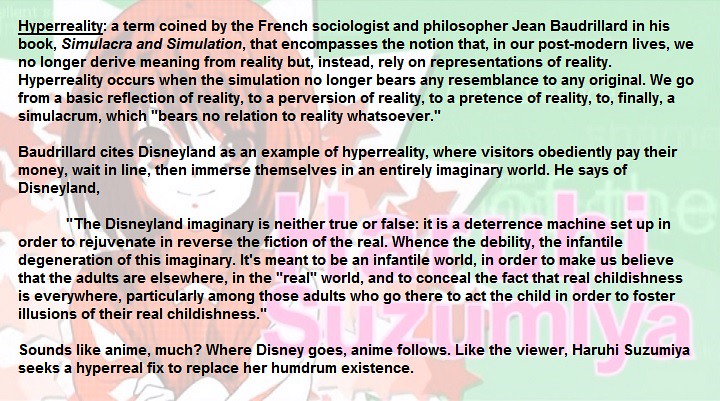
Production standards are improved over the already excellent first series. The background art is more detailed, the character designs more three dimensional and the animation, though still not a necessary feature, at least as good. I suppose the runaway success of its predecessor ensured a tidy budget second time around. Yutaka Yamamoto takes over as series director, although Tatsuya Ishihara retains a credit. I don't know who's responsible but the character designs are now more infantile and their stances and movements more anime-cliché. The visual gags are more slapstick and the facial expressions, while often more complex, are also more typical of other anime. Something of the unique feel of Kyon and Haruhi from the first season has been lost. Likewise the chemistry between them is diminished. On the plus side, the more I watch the franchise the more I'm coming to admire the work of Johnny Yong Bosch as Itsuki Koizumi, who nicely captures his unctious, mansplaining, ever-so-slightly creepy persona. Stephanie Sheh as Mikuru Asahina hurts my ears - she sounds like an adult woman speaking in a squawky voice. Wait! She is and she is. Michelle Ruff as Yuki Nagato succeeds in creating an emotionaless tone, but it's also a boring one. Think of Spock or Data from Star Trek where emotionless characters have melifluous voices. Because I get what Yuki is about I don't find Michelle Ruff as grating as Stephanie Sheh. Rating: decent. In its Sigh of Haruhi Suzumiya arc, the franchise has its second best premise after the original Melancholy of Haruhi Suzumiya arc, but the execution is spoiled by a nastiness in both Kyon and Haruhi that exceeds anything elsewhere. The Endless Eight arc takes a simple premise then expands it way beyond reasonable bounds, all for the sake of a postmodern joke on the audience. And, firstly, while the Bamboo Leaf Rhapsody episode gives us an hilariously sour young Haruhi, its full significance won't be apparent until the movie sequel. For all that, the series gave me more cerebral pleasure than any other part of the franchise. That's my thing; it may well not be yours. In short, season 2 emphasises over and again the shortcomings of the conceits in the franchise while not often enough parading its strengths. Only about half the season comes under a must watch rubric. 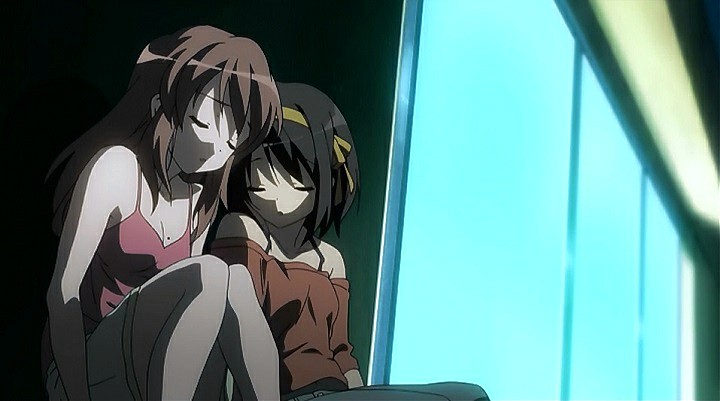
That's the Endless Eight for you. Last edited by Errinundra on Sun Oct 13, 2019 1:15 am; edited 4 times in total |
||||||
|
||||||
|
Errinundra
Moderator
Posts: 6523 Location: Melbourne, Oz |
|
|||||
|
We interrupt this Haruhi interruption of the early Toei films to bring you...
Your Name Reason for watching: How could I not? I've seen all Makoto Shinkai's previous films, so I'm not about to miss what has already become an anime phenomenon. Amazingly, it's getting a general release in several of the multiplexes in Melbourne and around Australia. For the sake of anime generally I hope it does well. I'm just back from watching the film this evening at the more arthouse warren of Cinema Nova in Carlton so, as you may expect, this post is based upon my first impressions. Non-warnings: Apart from the plot premise, which is established at the beginning of the film, I'll avoid spoilers. The images are taken from the Madman website and trailer, and, yes, the Australian release uses capitalised "Y" and "N". 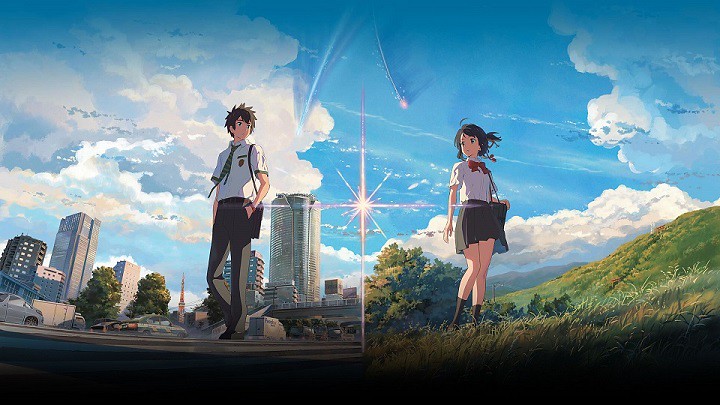
Synopsis: Mitsuha Miyamizu is a high school student in rural Japan who wishes she were a handsome male student in Tokyo. Taki Tachibana is a male high school student who dreams of escaping Tokyo. Their wishes are granted in a peculiar fashion when they find themselves periodically swapped into the other's body. With a comet making a spectacular approach to earth they wonder why fate has entangled them, whether the comet might be involved, and why remembering each other's name is so important for their future. Comments: I brought two sets of baggage to tonight's viewing: scepticism that the film couldn't possibly be as good as its Japanese audience numbers suggest; and a hope that it would be. From the outset I'll say Your Name is top notch Shinkai, so If you like his style and approach then you most certainly won't be disappointed. Your Name represents a further refinement of his preoccupations and a further development of his craft. He integrates the narrative threads with his thematic ideas better than ever before, portrays a female lead less condescendingly than previously, and, wonder of wonders, reveals that he has a sense of humour. Of course, the two signature Shinkai elements are breathtaking visuals and overwrought sentimentality. With a comet in the story line, there are plenty of opportunities for the kind of amazing sky panoramas that so dominate his earlier work, whilst Mitsuha's rural life allows for more of the spectacle seen in Children Who Chase Lost Voices. Highlight for me, however, is the simulated time lapse filming of a near future Tokyo. In my review of Children I drew attention to a similar trick with a cherry blossom tree during the opening credits. Your Name takes the gimmick to a new level. Shinkai has a budget like never before so he now has the chance to give us Ghibli like levels of detail. With the phenomenal success of this film, he may be in a budgetary position next time around to blow us away totally. 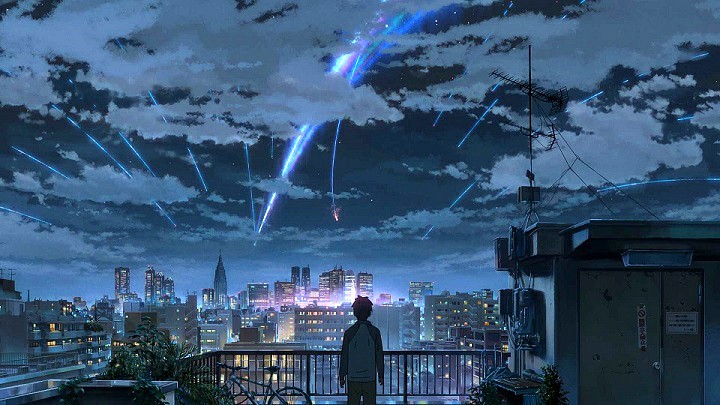
The character design and character animation are better than ever. Don't get me wrong, the designs aren't all that distinctive, but they avoid the clunkiness of earlier works. Masayoshi Tanaka, who gave us the distinctive visual personalities of Toradora! and the calculated designs of anohana: the Flower We Saw that Day, does a more than adequate job with Mitsuha and Taki. They aren't all that memorable as personalities, but that's the point in a way. While not anime cliché, with Shinkai the personalities rarely stand out. For one thing they are meant to be every boy and every girl. For another, their characters are secondary to the romantic dilemmas at the heart of most of his narratives. He is successful because his leads are us cast into a grand romance where we feel elevated and ennobled. In reality it's just confection, but it does give the viewer quite the hyperglycaemic buzz. The body swapping concept isn't exploited as much as it might have been - I suppose it has been done to death elsewhere - but it does provide one of the running gags: Taki's fascination with his newly acquired breasts. Mitsuha's younger sister's dismay and disgust are even funnier. Shinkai's films can be categorised into his plot-driven films (The Place Promised in Our Early Days and Children Who Chase Lost Voices) and his more impressionistic efforts (She and Her Cat, Voices of a Distant Star, 5 Centimetres per Second and The Garden of Words). Your Name is closer to the former, however the dramatic and romantic elements fit together better than they do in Place Promised while the narrative is more convincing than in Lost Voices. In this instance the various plot twists are central to the characteristic Shinkai trope of impeded love. The more complex or detailed his narratives, the weaker my emotional investment. In this instance, though, the story and humour provide as much a break on the sentimentality as a damper of emotion. Regardless, the movie also labours through some dull periods. As I've said elsewhere, short Shinkai is good Shinkai. For the first time outside of the one minute Gathering of Cats, Shinkai gives us the opportunity to laugh. The body swapping gags provide a welcome antidote to any lingering pretentiousness. Behind the gags lie some interesting ideas. One that could have been ripe for exploration is how our self-definition as female or male would be eroded if the gender of our bodies wasn't stable. I suppose the film had enough on its plate with other thematic requirements. The wit extends to the way both main characters earn brownie points for their alter egos when in body swapping mode. They also learn to empathise more. Shinkai favours neither one lead over the other, something I consider a huge step forward. Mitsuha may not be the most memorable female anime character you'll ever encounter but she isn't feeble, or lost, or damaged the way her Shinkai predecessors were. (One exception was Asuna from Children Who Chase Lost Voices, who, in any case, is ultimately undermined by her role as trophy for the competing males.) It has been a pleasure watching Shinkai improve his craft from one film to the next. One area where he is resolutely recalcitrant is in the dreary, sentimental, tuneless songs he inflicts upon his movies. They are nostalgia for amnesiacs. 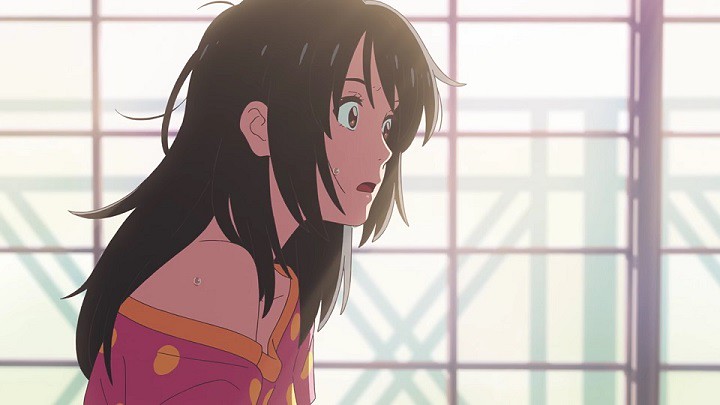
Rating: the low end of very good. With Your Name Makoto Shinkai combines narrative, romance, emotion and humour in a more convincing package than any of his previous works. There are some slow passages and the sentiment can be laboured - though he is improving. Above all, as to be expected, the film is a visual treat in a cinema. If you get the chance, give your eyes a feast in the setting the film was made for. I haven't rated this quite a highly as The Garden of Words, where the botanical vistas were even more breathtaking and where, until the ending, there was a more adult feel to it. That was more of a chamber piece; Your Name has grander ambitions. As usual, I look forward to where Shinkai takes us next. The baggage I brought to the viewing? Your Name isn't the masterpiece its Japanese box office sales suggest but it's rather better than I feared it might have been. Last edited by Errinundra on Fri Nov 25, 2016 5:33 pm; edited 1 time in total |
||||||
|
||||||
|
Zin5ki
Posts: 6680 Location: London, UK |
|
|||||
|
I declined my initial chance to see this film, on account of news that many subtitled screenings had changed to dubbed ones without forewarning. Adding to my relief in this decision, I later learned that projection and subtitling issues affected several people's viewing experiences, something I would never tolerate for a film that is seemingly as special as this one.
In any case, it will be a long wait until we have this safely on our shelves. Several industry insiders have complained that the lengthy delays between the initial screenings and the ultimate on-disc release will do little to support the cause against anime piracy. Being ever-wary of spoilers for this film will be the custom of many over the next year, I fear.
This is a point of difference between us, I am afraid. Long have I admired the incidental compositions of his films, if not their licensed insert tracks. I would imagine that someone's affective response to his scores has a certain immediacy to it that almost dictates any subsequent judgement: a stirring impulse in my case and a dreary, incommensurable one in yours. |
||||||
|
||||||
|
Errinundra
Moderator
Posts: 6523 Location: Melbourne, Oz |
|
|||||
|
^
In this instance I refer specifically to the insert songs. The incidental music is fine - the acoustic guitar, in particular, sticks in my mind. |
||||||
|
||||||
|
Zin5ki
Posts: 6680 Location: London, UK |
|
|||||
|
I see. I'm most sorry for the misunderstanding. In the case of the ending theme to The Garden of Words, I can certainly appreciate where you are coming from. (I would say the same about that of Children who Chase Lost Voices also, were it not for my conviction that said film was a lost cause.)
|
||||||
|
||||||
|
Jose Cruz
Posts: 1773 Location: South America |
|
|||||
|
Your Name was essentially the ultimate Shinkai movie: a romantic movie without the simple plots of 5 Centimeters per Second or Garden of Words instead incorporating a more meaty plot like Children who Chase Lost Voices which was my favorite Shinkai movie up to this point.
And I dislike the pop music Shinkai put in this movie personally but I still loved the other elements of the movie enough to give it a 10/10 rating. It was the first time I cried watching animation in well over two years. |
||||||
|
||||||
|
Errinundra
Moderator
Posts: 6523 Location: Melbourne, Oz |
|
|||||
|
^
I struggle to give Makoto Shinkai films a masterpiece rating because every time I see something of his I come away thinking he can do better. Other favourite directors can give us very different films or TV series: Satoshi Kon with Paprika and Millennium Actress; Hiyao Miyazaki with Spirited Away and Porco Rosso; or, to my eccentric tastes, Koichi Mashimo with Hyouge Mono and Noir. Each pairing is like chalk and cheese. I feel they nailed the project then moved on. (All right, Noir gave us two more girls with guns series, but the later Hyouge Mono was out of the blue.) Shinkai, however, gives us the same basic story every time but with somewhat different adornments, improving skill sets and expanding budgets. Because the progression is so apparent I find myself extrapolating to the next film, which I presume will continue the projection. I suspect one day he will reach an artistic zenith then begin to decline, at which point the magnum opus before the decline will become, in hindsight, a masterpiece. Before my pretention becomes even more outrageous here's a highly favourable review of the American dub (I watched the Japanese dub) from one of Melbourne's daily newspapers, The Age. |
||||||
|
||||||
Blood-
 Bargain Hunter Bargain HunterPosts: 23761 |
|
|||||
|
Popping back in here since I've now watched/rewatched all of TMoHS with the exception of the film, The Disappearance of Haruhi Suzumiya.
I probably should hold off full comment until I have seen the film, but patience has never been a strong suit. I will say (unless something in the film convinces me otherwise) that I reject the interpretation that Kyon is simply imagining all this in his head. I'll admit that part of this rejection is simple personal bias. Check out this premise: a talented, energetic girl yearns to break free from the mundane nature of every day life. She wants to meet exotic beings like time travellers, espers and aliens. Little does she know that some of the people surrounding her are exactly the kind of exotic beings she wants to meet. Little does she know that she actually does have the power to inadvertantly destroy the world and the SOS Brigade is charged with the misson of making sure that doesn't happen. The most important member of this group is Kyon, a thoroughly ordinary boy with no special powers, but the only one who can ensure Haruhi doesn't get so bored or so mad that she subconsciously re-writes reality as we know it. Sorry for the lengthy premise statement, but I wanted to include all the elements that make it so awesome. Okay, here's the premise statement if Kyon is, as Errinundra posits, an unreliable narrator: An ordinary highschool boy fantasizes that a girl in his class has the power to unwittingly destroy the world if she gets too bored or frustrated. Now, all the other elements of my first premise statement are still in play, so the comedy remains the same regardless of which interpretation you choose. What does change are the dramatic stakes. In addition to all the comedy, what you get in my version, for example, is the fun of watching a baseball game that could literally end in the destruction of the world if Haruhi remains unsatisfied with how it is going. So that's my personal bias. This show is much more interesting to me if the stakes are real as opposed to the construction of a bored boy's mind. Setting that aside, however, I did not detect anything in the show itself that would explicitly invite me to ponder whether or not Kyon is making this stuff all up. For example, in the episode where Kyon and Haruhi wake up in a closed space at their school, the show explicitly invited me to consider that what I was seeing was simply a dream. The scene was preceding by watching Kyon fall asleep and musing on the nature of REM sleep. The scene ends with him waking up suddenly in his own bed. When he gets to school the next day, he sees Haruhi is wearing her hair in a pony tail which keys off something he said in the "dream." The other members of the SOS brigade treat the incident as something that actually happened. But, because of how the scene was introduced and resolved, you can legitimately make a case, eiher way. The show itself is inviting you to make a judgement. I detect no such invitation with respect to judging whether the events we are seeing are actually happening or merely a product of Kyon's imagination. It seems to me such an interpretation has to be imposed externally based on a certain strain of critical theory. Errinundra, would you agree that there is nothing explicit in the show itself that invites us to doubt Kyon's relability as a narrator of events (the way the school scene referenced invites us to consider it a dream)? I certainly agree he is unreliable with respect to his feelings about Haruhi. He would be horrified to be accused of harboring positive, perhaps even romantic, feelings for her, but he clearly does. But setting that strain of unreliability aside, can you explain a bit more about why you think this stuff is all in his head? |
||||||
|
||||||
|
All times are GMT - 5 Hours |
||
|
|
Powered by phpBB © 2001, 2005 phpBB Group
